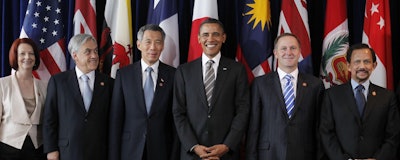
A wide-ranging bill that revamps U.S. trade laws won final congressional approval Thursday. It includes a provision that would reinforce the government's ability to head off China and other countries from manipulating their currencies to make their exports more affordable.
The Senate voted 75-20 for the measure, sending it to President Barack Obama, who is expected to sign it although the White House did not immediately indicate his intention to do so. That seems to reflect a difficult political balancing act between some sections in the bill that are popular and trade provisions many Democrats considered insufficient.
Supporters say the measure would strengthen U.S. trading by improving protections for American intellectual property like copyrights and trademarks and upgrading trade law enforcement at the country's borders
The legislation — especially its trade provisions — has pitted the U.S. Chamber of Commerce and other business groups supporting the bill against opponents including the largest U.S. labor federation.
The House approved the trade bill in December, with the backing of nearly all Republicans but just 24 Democrats. Despite two requests, White House press aides wouldn't say whether the president would sign the bill, though he is expected to.
While some Senate Democrats supported the bill, others complained that its trade protections were insufficient and said negotiators who wrote the House-Senate compromise weakened it significantly, including the currency manipulation language.
Democrats also disliked provisions barring trade agreements that would curb some efforts to restrict greenhouse gas emissions, a major contributor to climate change, or would force the U.S. to revamp its immigration laws.
 (AP Photo)
(AP Photo)The measure also includes a provision that would permanently bar state and local governments from taxing access to the Internet.
For years, the drive in Congress to permanently bar taxes on Internet service has languished alongside another effort to empower states to require online retailers to collect state and local sales taxes for online purchases. Supporters of enhancing the collection of sales taxes for online sales say without that, brick-and-mortar stores face a competitive disadvantage.
In hopes of gaining leverage, senators backing the collection of online state sales taxes have linked the two efforts.
A breakthrough occurred this week when Senate Majority Leader Mitch McConnell, a Republican, agreed to hold a vote this year on the proposal making it easier for states to collect sales taxes for online transactions. Even so, some lawmakers were upset that the Internet sales tax measure would be considered later, with no guarantee of success.
Sen. Harry Reid, the Democratic minority leader, said the bill was full of "missed opportunities and half measures."
Since 1998, in the Internet's early days, Congress has passed a series of bills temporarily prohibiting state and local governments from imposing the types of monthly levies for online access that are common for telephone service. Such legislation has been inspired by a popular sentiment that the Internet should be free — along with Republican opposition to most tax proposals.
Until now, states that had already imposed Internet access taxes have been allowed to continue. Under the bill the Senate was considering, those states would have to phase out their taxes by the summer of 2020.






















